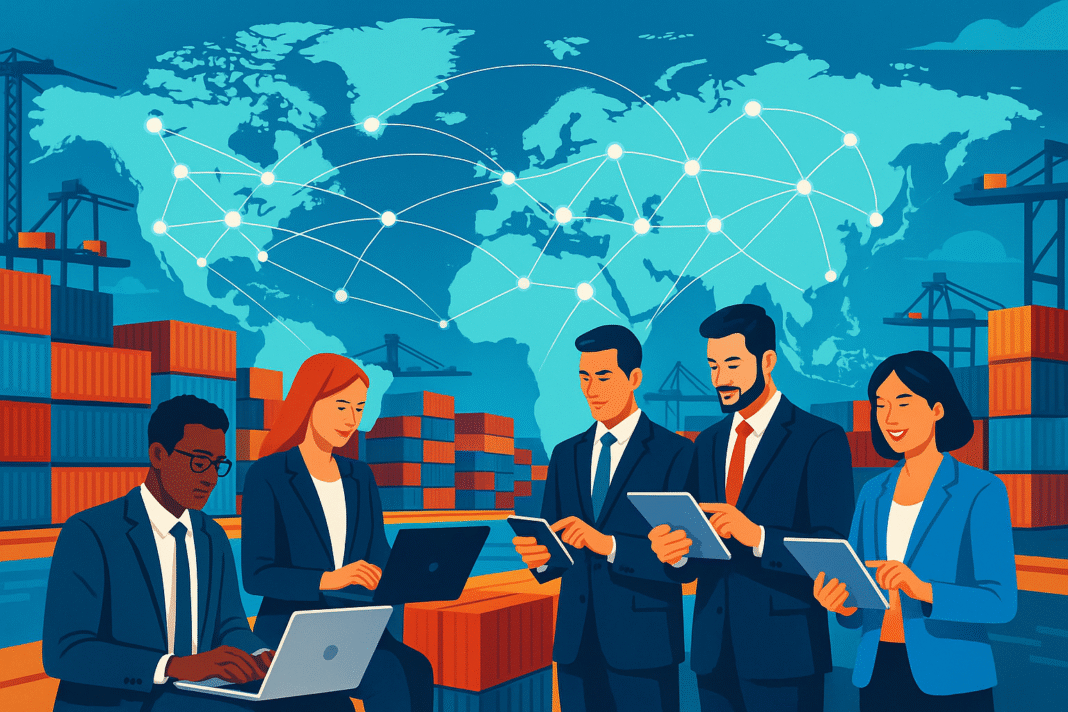The global trade landscape is undergoing a revolutionary transformation as B2B marketplaces emerge as the dominant force in international commerce. What began as simple online listing platforms has evolved into sophisticated ecosystems that connect millions of buyers and sellers across continents, fundamentally changing how businesses source products, manage supply chains, and scale their operations globally.
The Digital Commerce Revolution
B2B marketplaces have experienced explosive growth, with the global B2B e-commerce market reaching an astounding $32.11 trillion in 2025, projected to grow at a compound annual growth rate of 14.5% to reach $36.16 trillion by 2026. This represents a dramatic shift from traditional trade methods, where businesses relied heavily on personal relationships, trade shows, and lengthy sales cycles.
The transformation is being driven by a fundamental change in buyer behavior. Today, 73% of B2B buyers prefer ordering online, with 64% of new-age B2B buyers choosing digital channels over traditional ones. This shift reflects a generational change as millennials and digital natives assume purchasing roles, bringing B2C-like expectations to B2B transactions—demanding instant access to information, transparent pricing, and seamless user experiences.
Breaking Down Global Barriers
Perhaps the most significant impact of B2B marketplaces is their ability to democratize international trade. Small and medium-sized enterprises (SMEs) can now compete on a global scale without the massive infrastructure investments traditionally required for international expansion. These platforms provide immediate access to global markets, enabling a manufacturer in Maharashtra to secure European buyers through digital connections that would have been impossible just a decade ago.
The marketplaces offer comprehensive ecosystems that include payment protection, buyer verification, marketing tools, and logistics integration. This eliminates many of the traditional barriers to international trade, such as trust issues, complex payment systems, and supply chain coordination challenges.
Technology-Powered Transformation
Artificial intelligence and automation are at the heart of this transformation. Modern B2B marketplaces leverage AI for intelligent supplier-buyer matching, predictive demand forecasting, and automated inventory management. These systems analyze historical data, market trends, and external factors to provide real-time insights that help businesses make informed decisions faster than ever before.
AI-powered tools are revolutionizing supply chain management by enabling demand forecasting accuracy improvements of up to 72%, while reducing transaction costs and improving operational efficiency. Machine learning algorithms can now predict potential supply chain disruptions, optimize shipping routes, and automate routine processes like order management and invoice generation.
The Payment Revolution
Digital payment systems and blockchain technology are eliminating traditional financial barriers in cross-border trade. Blockchain-enabled payments can reduce transaction costs by 40-80% while completing transactions in just four to six seconds. This represents a massive improvement over traditional international payment systems that often took days to process and involved multiple intermediaries.
Companies like Ripple are building global networks that connect major banks, enabling real-time messaging and settlement between financial institutions worldwide. These innovations are making international trade more accessible to smaller businesses that previously couldn’t afford the complexity and costs of cross-border transactions.
Sustainability and Specialization
The marketplace ecosystem is becoming increasingly sophisticated, with platforms rewarding eco-friendly suppliers through better visibility and specialized marketplaces emerging for specific industries. This trend toward sustainability sourcing reflects growing corporate responsibility requirements and consumer demand for environmentally conscious business practices.
Niche marketplaces are gaining traction by offering specialized products and services tailored to specific industries, from construction to independent retail. This specialization allows businesses to find exactly what they need while building deeper relationships within their industry ecosystems.
Challenges and Opportunities
Despite the remarkable growth, challenges remain. Regulatory variations across countries, cybersecurity threats, and interoperability issues continue to pose significant obstacles. However, initiatives like the Open Network for Digital Commerce (ONDC) in India and standardized payment systems are addressing these challenges systematically.
The integration of advanced technologies is creating new opportunities. AI-powered product recommendations, dynamic pricing models, and real-time inventory optimization are becoming standard features that help businesses maximize their market reach and operational efficiency.
The Road Ahead
As we look toward the future, B2B marketplaces are positioned to capture an even larger share of global trade. In India alone, the B2B online marketplace represents a $200 billion opportunity by 2030. With government initiatives supporting digital transformation and technological advancements in AI, blockchain, and payment systems, the foundation is being laid for unprecedented growth in digital trade.
The shift from traditional trade methods to digital-first approaches is no longer optional—it’s essential for survival in the modern global economy. Businesses that embrace these marketplace platforms and the technologies they offer will be better positioned to compete, scale, and thrive in an increasingly interconnected world. The future of global trade is digital, and B2B marketplaces are leading the charge toward a more efficient, transparent, and accessible international commerce ecosystem.





